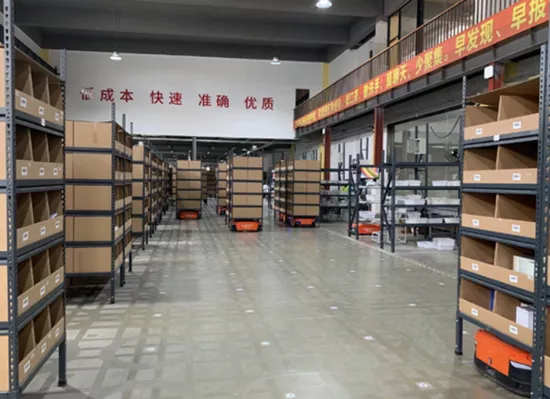"Since the outbreak of the disease, I have received a package delivered to my door for the first time today. In the past two days, the express delivery has been extremely fast." On June 2, Miss Zhang, who lives in Jinxiu Huacheng, Pudong New Area, Shanghai, received seven packages from tmall supermarket sent by Li Xiaoyu. Lixiaoyu is a rookie courier. During the period of Shanghai's closure, she lived in the distribution station and private car for two months. Her main distribution is rice, edible oil and other basic living materials. After Shanghai fully restored normal production and living order on June 1, lixiaoyu finally returned to her home. In recent days, more packages have been sent into cola and other drinks, as well as many zongzi.
Author / chenshanshan, huangqiong
The Shanghai Post Office said on June 1 that at present, the Shanghai transfer center of major express enterprises has resumed work and production. Express enterprises have started to resume work in an all-round way. Some enterprises' single day business volume in Shanghai has exceeded the peak level before the epidemic.
However, in the past two months, more than 75% of the express outlets, end delivery vehicles and express personnel in Shanghai (more than 50000 in number) were closed down as the whole city, and only a few guaranteed supply enterprises with passes were trying their best to maintain the production and life of key enterprises and community residents around the clock.
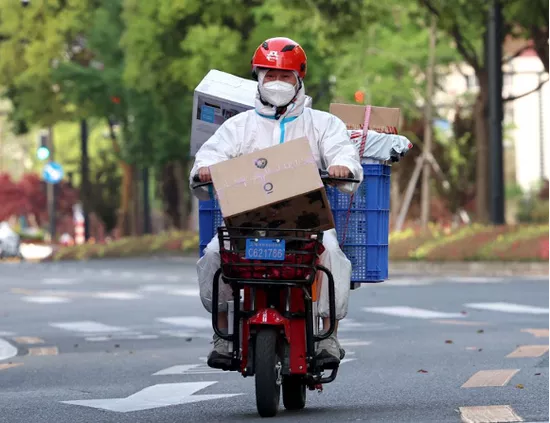
Reply: why Jingdong, an insurance and supply enterprise, is late
In April, in order to do a good job in epidemic prevention and control and living material support, all districts of Shanghai announced the list of guaranteed supply enterprises. In this "white list" of guaranteed supply, there are many express logistics enterprises, such as postal service, SF, Cainiao, JD, etc.
The biggest support for these guarantee supply enterprises is the pass issued by the municipal government. With a vehicle pass, you can continue to transport in the city of Shanghai during the closure period, and people with a pass can walk outside the community.
As an e-commerce platform with its own logistics team, JD is one of the enterprises that have obtained the most vehicle passes, with a number of about 10000. However, before the middle of April, most Shanghai residents could not receive the living materials and other packages ordered from JD. What happened during this period?
In practice, JD needs to go through several links to deliver the goods on the order to customers in Shanghai: trunk line transportation, warehouse sorting, distribution to outlets, and outlets to the community. During the Shanghai containment period, each node is faced with uncertainties and needs to change its daily link planning at any time.
In terms of trunk transportation, highway transportation is the most commonly used and cost-effective transportation mode for express enterprises. However, since March, local prevention and control have been stepped up at various levels, and epidemic prevention policies have been constantly changing. Some prefecture level cities and even different counties and districts have issued their own policies, which have had a direct impact on the trunk line transportation of express delivery. For example, it would have taken more than 30 hours for a truckload of goods to travel from Chengdu to Shanghai. It may take more than 50 hours or even longer during the epidemic.
While the time for goods to enter Shanghai has been lengthened, many warehouses connecting Jingdong with the trunk line transportation have also been closed down with the closure of Shanghai and surrounding areas.
According to the previous model, after the goods from other places are transported to Shanghai by trunk trucks, they will first enter JD's large warehouse in Shanghai. For example, JD's "Asia No. 1" warehouse in Jiading District is one of the largest and most advanced e-commerce logistics "warehouses" in China, and it is also the most important logistics hub in JD's Yangtze River Delta, where people's livelihood and 3C commodities are mainly stored.
However, due to the presence of a positive infected person, the "Asia-1" project was shut down at the early stage of Shanghai's closure and control. JD's warehouse in Kunshan, near Shanghai, was also responsible for some orders in Shanghai. It was also controlled because of the local epidemic, and the entry of goods from Kunshan into Shanghai was also restricted.
The main function of the large warehouse is to prepare goods in advance and distribute them in a centralized way. After sorting the foreign goods according to different regions, they are delivered to the regional sorting center in Shanghai and then to the business department responsible for the last kilometer of distribution. At the initial stage of Shanghai sealing and control, some sorting centers, even if there are no positive ones, will be required to suspend operation by the epidemic prevention department in their area. A person from an express delivery enterprise pointed out to the reporter that if express delivery is equivalent to a water pipe, the faucet is the distribution center. If the sorting bin is not open, the water pipe will have no water to flow.
The large warehouses in Shanghai and Kunshan have been restricted one after another, so that JD logistics, even with vehicle passes and supply guarantee qualifications, has begun to "make bricks without straw". For more orders in Shanghai, the link needs to be re planned, so that suppliers can re deliver goods from JD's warehouses in Guangzhou, Chengdu, Wuhan, Beijing and other places, and then enter Shanghai through long-distance transportation. When entering Shanghai, they also need to change cars (the guarantor does not purchase goods), which will take a longer time.
"We have a large number of warehouses in Shanghai, Kunshan and Wuxi, ranging from dozens to hundreds in size. Since the end of March, many of them have been affected. Since then, due to the different degree of sealing control in each district of Shanghai, each warehouse has been affected differently. In addition, according to the epidemic situation in its Street area, there will be real-time dynamic adjustment, and the attendance of sorting personnel is also unstable." Zhang Li, head of Jingdong Logistics Supply Chain Planning, recalled, "So we set up a temporary warehouse in Shanghai, including a special warehouse set up in Qingpu and Jinshan, as well as a front-end warehouse that uses the space of the site. The main purpose of the warehouse is to quickly and directly deliver the materials of brands to the warehouse, and we also transferred a group of managers from Jiangsu; the front-end warehouse is equivalent to taking the terminal business department as a warehouse, and directly distributing the fast-moving consumer goods such as milk, which are in great demand by residents, to the business department After the user places an order, they can quickly deliver the goods from the site to the user's community. This is also our new attempt during this round of epidemic in Shanghai. "
Zhang Li believes that the landing of the special warehouse for guarantee and supply and the advance setting of the front warehouse are valuable experiences that can be promoted later. Similar to the annual "618" pre-sale, according to the dimension of the community, the living materials with strong consumer demand are allocated to the pre-sale warehouse in advance, which can reduce the uncertainty of goods from the distribution center (which may not be able to be shut down temporarily), packaging (insufficient personnel), road transportation (blocked) and other links, and improve the distribution efficiency.
However, JD has only 78 front-end warehouses in Shanghai this time, while JD logistics has 282 terminal sites (business departments) in Shanghai.
There is no large-scale front-end warehouse, which is not only related to the area and space of the site and whether the storage conditions can meet the requirements, but also related to the fact that most of the distribution personnel in the sales department are closed in their own community and cannot carry out distribution work.
It is understood that JD's local distribution brother in Shanghai originally had more than 7000 people, and in the early stage of the closure, two-thirds of the brothers were sealed in their own community. "Later, brothers came out gradually, but some areas were sealed and controlled. Even if we had the certificate, nucleic acid certificate and letter of commitment as a guarantee and supply enterprise, people still couldn't come out according to the local epidemic prevention policy. The number of people on duty at many terminal sites changed every day, and the amount of goods that could be delivered every day was uncertain." Xuruofei, head of East China human resources of JD logistics, told reporters.
A Jingdong brother in the business department of a station in Shanghai told reporters that there were more than 30 people in his business department, less than half of whom could go out of the community and stay in the hotel arranged by the company, but their passes also needed to be updated every day. Sometimes, according to the changes of the epidemic situation, the number of passes would be reduced. Even if someone had a pass all the time, there were not many packages that could be delivered by the sales department at the early stage of the closure from the end of March because there were not many goods from the distribution center.
Despite problems in all aspects, in the week after April 9, JD still delivered nearly 4000 tons of food, oil, meat and milk and other livelihood materials to more than 1.4 million families in Shanghai. However, due to the surge of livelihood materials ordered online by Shanghai residents during the community closure period, such distribution efficiency is far from enough.
This is also an important reason why JD urgently deployed more than 3000 foreign JD brothers to help Shanghai in mid April. By the end of May, JD logistics had sent more than 5000 additional couriers and sorters from all over the country to Shanghai, the farthest from Xinjiang. The accommodation of these Jingdong brothers in Shanghai once became a problem. Finally, through the coordination of resources from the government, the media and other parties, most of them lived in hotels or individual apartments that were not requisitioned, and some of them lived in school dormitories designated by the government.
With the arrival of Jingdong brothers from other places in Shanghai since the middle of April, the operation of "Asia No. 1" warehouse was restarted on April 18, and the supply chain blockages and obstacles such as warehouse, transportation and terminal distribution were gradually cleared up, more and more Shanghai citizens have received express from Jingdong, and the delay in distribution has been alleviated. However, due to the different prevention and control management requirements of each street and community in Shanghai, the specific performance of JD in different communities has also been uneven.
In order to further improve the distribution efficiency, starting from April 14, JD has also transported scarce drugs and people's livelihood materials from all parts of the country to Shanghai every day through charter flights and all cargo planes with higher costs. In addition to air transportation, there are also special sea lines from Guangzhou and railway containers from Guangzhou, Wuhan, Chengdu and other places. By the end of May, JD logistics had organized more than 300 warehouses across the country to transport more than 150000 tons of materials including rice flour, grain and oil, medicines, mother and baby supplies, etc. for Shanghai. By the end of May, its one-day delivery in Shanghai had exceeded the peak level before the epidemic.
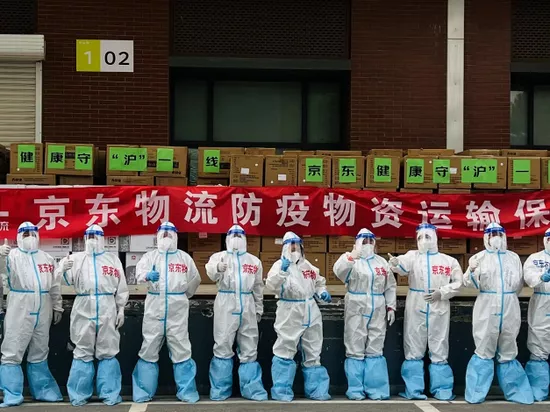
Tracing back to the source: why is the main distribution force in Shanghai "absent collectively"
The reason why JD's business volume exceeded the peak level before the epidemic was that several express companies (also the main distribution companies of Taobao and pinduoduo orders) were "tied up" with the daily main distribution companies in Shanghai, and many users' orders went to JD's related departments.
As early as mid March, Gan Chengcheng, the boss of the North Jiuting branch of Zhongtong express in Shanghai, who was worried that they would not be able to deliver goods from the community, and nearly 10 employees had already lived in the office of the park where the branch was located in advance. However, after Shanghai entered the global sealing management, they still encountered the embarrassment of having people, cars and no goods.
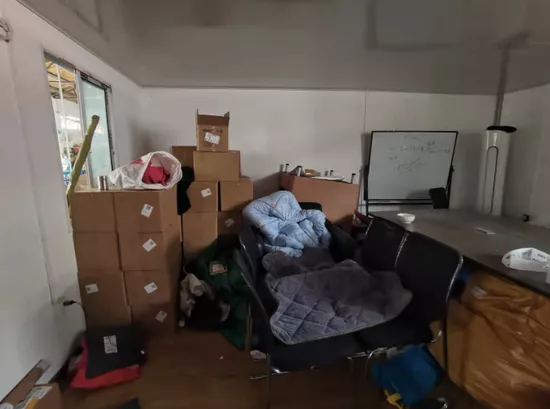
"At the beginning of April, the transfer center in Puxi was suspended due to the escalation of epidemic control. That night, our packages were delivered to the transfer center in Pudong. Later, Pudong could not deliver them. There was no goods from the transfer center, so naturally there was no package to deliver." Gan Cheng recalled that such a situation was quite unexpected for him, because at the beginning of 2020, when the COVID-19 broke out, the community was once sealed and controlled for management, but the express delivery has not stopped.
Before the closure in Shanghai, Gan Cheng applied for vehicle passes for two large trucks, which could be driven in Shanghai during the closure period. However, after the suspension of the company's transfer center, the two 4-meter-2 and 7-meter-6 trucks had no place to play. On April 15, Gan Cheng "now the company has a car, a 4-meter-2 and a 7-meter-6 pass, which can be contacted for vehicle transportation..." I hope to find some business to make a living for my network brothers who have nothing to do for half a month.
It was around that day that he and his brothers began to accept the "private work" of delivering orders in the city, such as errands on platforms such as flash delivery and meituan. They drove their cars wherever they needed to deliver goods.
The experience of Gan Chengcheng and his express outlets in the "three supplies and one delivery" express companies is not a special case.
"Three supplies and one delivery" refers to several private express companies with franchise system, such as Zhongtong, Yuantong, Shentong and Yunda. During the period of sealed control in Shanghai, most of their distribution centers (transfer centers) and outlets in Shanghai were required to be closed down by their regions because they were not included in the list of guaranteed supply enterprises, involving tens of millions of square meters of sites and plants, dozens of modern assembly lines, thousands of urban distribution branch transportation vehicles (vehicles transporting goods from the distribution center to outlets), as well as more than 50000 employees and more than 50000 terminal distribution vehicles (mainly two wheeled electric vehicles).
At an internal Symposium in early April, a series of data thrown out by one of the "three supplies and one delivery" express companies directly reflected the real situation faced by the express industry in Shanghai at that time: at that time, more than 75% of express outlets, vehicles and personnel in Shanghai were closed down, and the salespersons of outlets were basically isolated in their homes; The whole Shanghai Express Industry (excluding JD) has only received a few hundred vehicle passes issued by the city, and it actually needs more than 5000 to ensure the branch line operation (transportation from the distribution center to the outlet). Moreover, some districts do not recognize the vehicles with passes across districts, and even the passes have been confiscated. The number of active end stations in the city is less than 5%, and the delivery volume in the three days of Qingming Festival is only 1% of that in the same period last year.
Statistics from Shanghai Post show that in February, the express delivery industry in Shanghai had a business volume of 560million pieces, an average daily business volume of about 20million pieces, and a delivery volume of nearly 20million pieces / day, which is equivalent to one package per Shanghai citizen per day. This includes a large number of daily necessities, necessities, medicines and fresh food, 70% of which are distributed by the "three supplies and one delivery". It can be said that they are the main force of daily express delivery in Shanghai.
However, after the implementation of the closure control in Shanghai, the "collective absence" of the main distribution force is equivalent to that at least 70% of the packages of Shanghai citizens cannot be delivered normally, while the remaining 30% of the distribution force is completed by postal service, SF, JD and Cainiao. They are mainly busy with the "transportation guarantee" of key enterprises and the supply guarantee of key materials and special groups.
Yaojun, general manager of SF Express Group (Shanghai) Express Co., Ltd., recalled that as early as late March, under the leadership of Shanghai Municipal Commission of Commerce, SF temporarily set up four transfer stations, namely, Pinghu in Zhejiang, Kunshan in Jiangsu, the western suburb of Qingpu in Shanghai and Jiangqiao in Shanghai, creating a "non-contact" operation mode of drop hook connection, transferring people's livelihood materials to designated places in Shanghai, and completed the transportation and transfer of vegetables and living materials in two months, with a total of 50100 tons and 2805 vehicles.
In the middle of April, SF built a temporary Huxi transfer station to gather aviation and railway resources, ensure the operation of more than 1300 white list enterprises, and complete the transportation of 33700 tons of production materials.
Rookie revealed that rookie drivers with passes in April and may were mainly engaged in two businesses: first, emergency logistics. For example, the municipal civil affairs department coordinated the deployment of the transport capacity of the rookie danniao team to deliver materials to a number of nursing homes; Second, the parcel distribution of tmall supermarket, which sends the packages of rookies in the Maochao warehouse in Shanghai Jiading park directly to Shanghai citizens' homes by danniao team.
Among them, the second part of the business is difficult to run smoothly. The novice truck driver found that the package could not move when it was transported to a certain area. Either there was a problem with the distribution station, or there was a problem with the distribution station at the end of the community, or the delivery staff were closed in their own community and could not deliver the last kilometer. This is the same situation faced by JD and SF.
Therefore, in the past two months, Cainiao's trucks were mainly used to ensure the operation of the first part of the business. Its Maochao warehouse in Jiading park is a rare warehouse that has not been closed since the closure, In the middle of April, it was gradually transformed into a "special warehouse for the elderly", which was dedicated to the storage and distribution of civil aid materials for the elderly. In two months, it sent vegetables, rice, oil, masks, protective clothing and other materials to more than 20000 elderly people in more than 200 nursing homes in 14 districts of the city.
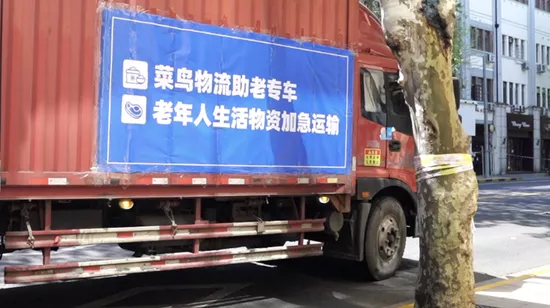
The "collective absence" of the main express workers who are responsible for the daily delivery of Shanghai citizens is also an important reason why some take away riders or errands can make more than 10000 yuan a day in early April.
At the initial stage of Shanghai sealing control, most residents who were unable to go out and receive online parcel orders could only complete their shopping and intra city mailing needs through third-party distribution platforms such as takeout, SF intra city and flash delivery. When the rider is nervous, the user can give priority to the rider to receive orders through "reward".
In mid April, in response to the news spread on the Internet that the knight in Shanghai earned more than 10000 yuan, SF confirmed that the knight received 60 orders that day, and the user received a reward of about 7856 yuan, an average of about 131 yuan per order.
"For a long time, many residents' daily necessities, medicines, fresh food, etc. have been sent to the people from other places by express. If the market-oriented express channels were guaranteed at the beginning of the epidemic, the organizational division and information system of the existing express enterprises would be more efficient, safe, economic and controllable than the logistics organized by the temporary districts or even the streets themselves." Many people in the express logistics industry pointed out to the reporter that express logistics is a networked operation, which requires the gradual connection of various nodes, rather than the circulation mode of a single region. The supply guarantee of 25million people in Shanghai needs a huge and efficient system, which can not be solved by one or two enterprises. It is necessary to coordinate the division of labor and cooperation of many logistics express enterprises to form a unified express logistics group army, Let the main daily distribution force become an important part of the supply guarantee force, and behind this, we need the unified allocation of resources under the premise of full collection of information and big data, so that we can clearly know where the real available capacity is.
Under the background of normalization of epidemic prevention and control, Yao Jun suggested that a batch of guaranteed supply logistics express enterprises be pre certified, and emergency logistics system plans for different guaranteed supply enterprises should be launched according to different epidemic ranges and levels, and emergency guarantee government enterprise cooperation drills should be implemented in advance to make the guaranteed supply enterprises under normal management.
Xuyong, a person in the express industry, also pointed out to the reporter that under the background of normalization of epidemic control in various regions, the government and enterprises should work together to develop emergency plans and establish an emergency response mechanism. Once a large-scale epidemic is sealed and controlled again, what should be done, including the mobilization of vehicle sources in other cities nationwide, the mobilization of warehouse goods, and the filling of personnel allocation under the temporary sealing and control of a city, For centralized residential closed-loop management, relevant plans should be made in advance. Enterprises should also establish a communication mechanism with relevant government departments to obtain greater recognition and support, so that market-oriented resources can be better used by the government.
Future: emergency plan under the normalization of prevention and control
In terms of emergency plan, moxiling, deputy director of Shenzhen Municipal Market Supervision Bureau, disclosed at the press conference on epidemic prevention and control held in Shenzhen on March 14 that as early as the beginning of this year, the Shenzhen municipal government had made a prediction in advance and issued the emergency plan for maintaining supply and stabilizing prices of agricultural products under extreme circumstances in view of the four possible situations of "unable to supply", "unable to enter", "unable to distribute" and "unable to deliver" agricultural products under extreme circumstances.
In the closed control of Shenzhen City, which began on March 14, the above plan was also launched and implemented. The Shenzhen Municipal Commission of Commerce has also specially formulated a special work plan and emergency plan to ensure the stability of market supply from ten aspects, such as smooth communication, transportation, launching of "three networks" and scientific and technological enabling distribution. Take out riders and express boys take the post with "three piece set" of nucleic acid negative certificate, work permit and ID card within 24 hours, and implement non-contact distribution. As long as the kids hold the "white list" reviewed by the community, they can normally enter and leave the community. They don't have to worry about not being able to go out, and they don't have to worry about not being able to ensure the normal distribution of urban materials.
Xu Wei, deputy director of the Shenzhen Municipal Bureau of transport, also introduced that in terms of ensuring the smooth flow of urban freight, he not only launched an emergency plan to deal with the problems that may hinder the cross city transportation of domestic goods, but also issued a vehicle pass to vehicles transporting fresh goods and other goods. He also did a good job in emergency capacity reserve. The municipal emergency capacity team has reserved enough freight vehicles, including ordinary goods vehicles, cold chain transportation Many types of vehicles, such as hazardous chemicals transportation, are ready to respond to the needs of each region and make up for the transportation capacity gap.
It is worth noting that some take away riders and express delivery brothers in Shenzhen took the initiative to spend the night outside because they were worried about the impact of the epidemic on their work and family health. After learning about the situation, the relevant departments of Shenzhen City and district temporarily transferred the activity places, mobilized materials to lay all-round shops, provided free hot water, instant noodles, hand sanitizer, fruits, quilts and other materials, provided a warm harbor for riders to rest at night, and urgently handled access cards for them to ensure normal distribution. The relevant departments also opened some school buildings or emergency places, coordinated service post stations or hotels, Provide services for the express brother for work and rest.
According to the data from Shenzhen postal administration, during the closed control period from March 14 to 20, the express delivery industry of Shenzhen post delivered 23.64 million express pieces to the public in total, making positive contributions to the industry in terms of drug safety distribution, logistics transportation in the medical industry, and supplies for people's livelihood, and there was no epidemic of work-related infection among express delivery brothers.
"As all express employees have to implement the 'one-day inspection' of nucleic acid before they can work, express companies have also signed a letter of commitment for epidemic prevention and control in special periods. During the week of being sealed in Shenzhen, no courier has been sealed in their own community. As long as the daily nucleic acid test is passed, they can work normally with a 'white list'." an insider of a express company in Shenzhen told reporters that as long as the government does a good job of supervision, And cooperate with the express enterprises to quickly receive, isolate and treat once the personnel are infected, so as to avoid cross infection of front-line personnel and link contact with people. The relevant emergency response plan for the recipient's infection can realize the continuous express logistics during the sealing and control period, as well as the stable, efficient, economic and safe operation.
During the sealing and control period in Shanghai, Gan Chengcheng and his network brothers still insisted on the rhythm of nucleic acid detection every other day, although they could not deliver packages normally. As early as March, the unified requirement of Zhongtong express was that the courier should hold a 48 hour nucleic acid negative certificate before taking the post.
In Shanghai, couriers were not included in the green channel for nucleic acid detection. Due to the long detection time and the long reporting time, it was more difficult to guarantee the delivery efficiency that had been slowed down. Therefore, many express companies also suggest opening a green channel for the detection of express logistics employees. Under the guidance and organization of the government, regularly, preferentially, orderly and efficiently carry out nucleic acid / antigen detection for all employees, determine the validity period of the detection results, and all kinds of personnel can go in and out or operate with the relevant detection clearance marks / electronic labels.
In the context of normalization of epidemic prevention and control, many people in the industry expect that express logistics enterprises will also accelerate the layout of contactless distribution equipment such as automation equipment and unmanned vehicles.
During this round of Shanghai sealing and control, JD mobilized 100 intelligent express vehicles and put them into use in closed communities and shelter hospitals in Jiading, Pudong and other places. They not only sent living supplies such as rice, flour, grain and oil to community residents, but also sent boxes of protective clothing, masks, disinfectants and other epidemic prevention supplies to medical staff and community volunteers. An intelligent express truck with a load of 200 kg and a running distance of 100 km after a single charge drives to the door through remote control. You can directly pick up pieces by entering the pick-up code or scanning the code.
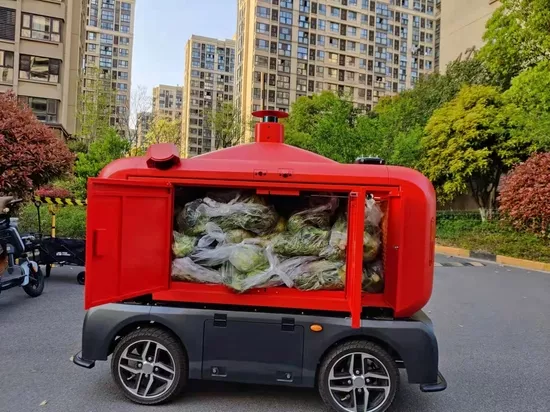
Prior to this, JD has never mobilized more than 100 unmanned vehicles at one time for rapid and intensive deployment and online use in a city, posing great challenges to the backstage technology, map management and personnel deployment.
The rookie "little man donkey" unmanned vehicle, which was originally responsible for campus express delivery, was also transferred to the community to support the distribution of "the last 100 meters" of community living materials during the current round of epidemic in Shanghai. One unmanned vehicle can carry about 150 kg, about full of goods on nearly one shelf. One trip can save 30 minutes of delivery time and relieve the transportation pressure of volunteers.
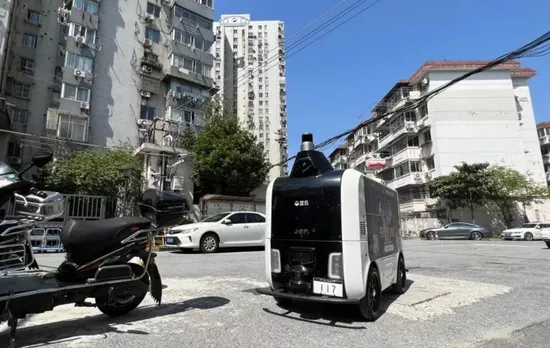
In the main transfer centers of many express enterprises, storage robots have been gradually launched. The "violent sorting" that originally relied entirely on manual operation has become a more efficient day and night sorting and handling of robots.
"At present, many logistics enterprises all over the country are launching unmanned warehouses, among which robots and mechanical arms are standard configuration. The management of an express delivery enterprise in the" three supplies and one delivery "told reporters that the main purpose was to improve sorting efficiency and reduce costs. Under the normalization of epidemic prevention and control, it can also reduce manpower and the probability of cross infection.
